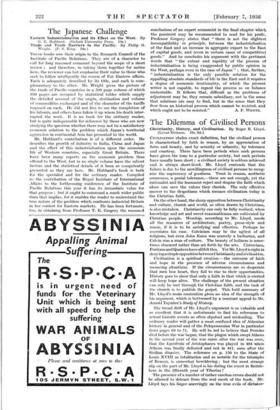The Japanese Challenge
Eastern Industrialisation and its Effect on the West. By G. E. Hubbard. (Oxford University Press. 18s.) Trade and Trade Barriers in the Pacific. By Philip G. Wright. (P. S. King. 18s.) THESE books owe their origin to the Research Council of the Institute of Pacific Relations. They are of a character to call for long reasoned comment beyond the scope of a short review ; and therefore, in taking them together for notice here, the reviewer can but emphasise their value to those who seek to follow intelligently the course of Far Eastern affairs.
Each is adequately described by its title, and each is com- plementary to the other. Mr. Wright gives the picture of the trade of Pacific countries in a 500 page volume of which 350 pages are occupied by statistical tables which supply the detailed account of the origin, destination and volume of commodities exchanged and of the character of the tariffs imposed on each. He did not live to see the completion of his labours, and others have taken it up where his death inter- rupted the work. It is no book for the ordinary reader, but is quite indispensable for reference by those who are now studying the question whether there may not be a satisfactory economic solution to the problem which Japan's territorial aggression in continental Asia has presented to the world.
Mr. Hubbard's contribution is of a different order. He describes the growth of industry in India, China and Japan and the effect of this industrialisation upon the economic life of Western countries, especially Great Britain. There have been many reports on the economic problem thus offered to the West, but in no single volume have the salient factors and the statistical details of it been so competently presented as they are here. Mr. Hubbard's book is both for the specialist and for the ordinary reader. Compiled as the contribution of the Royal Institute of International Affairs to the forthcoming conference of the Institute of Pacific Relations this year it has its immediate value for that purpose ; but it ought to command a much wider public than that implies, for it enables the reader to understand the true nature of the problem which confronts industrial Britain in her contest for Eastern markets. He has been fortunate, too, in obtaining from Professor T. E. Gregory the reasoned conclusions- of an expert economist in the final Chapter which the pessimist may be recommended to read for his profit. Professor Gregory states that " there is not the slightest incompatibility in principle, between the industrialisation of the East and an increase in aggregate export to the East of capital goods, and (even in certain cases of competitive) goods." And he concludes his argument with the pertinent words that " the extent and rapidity of the process of industrialisation is being exaggerated by public opinion in the West, perhaps even in the case of Japan " ; that, further, " industrialisation is the only possible solution for the appalling absolute standards of life in the East and it requires a degree of economic irrationality, of which the present writer is not capable, to regard the process as on balance undesirable. It follows that, difficult as the problems of adjustment may be, they remain subsidiary, not in the sense that solutions are easy to find, but in the sense that they flow from an historical process which cannot be resisted, and which ought not to be resisted." A. F. WHITE.














































 Previous page
Previous page